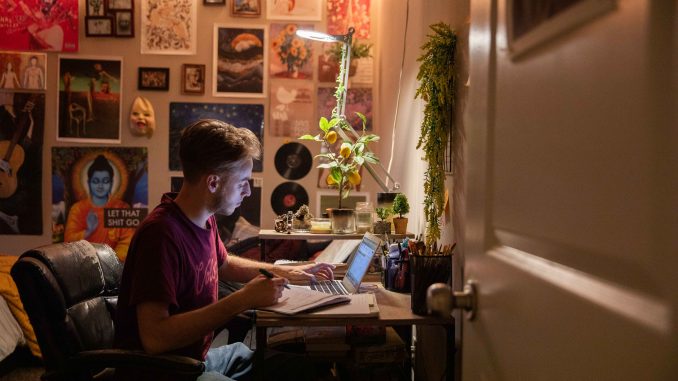
After years of not seeing the LGBTQ community represented in media, Andreas Copes decided to do something about it.
“What we see on screen is also going to then translate into how we understand the world, and if we see a more diverse spectrum of people on television, we then understand how diverse this world is and therefore become more tolerant,” said Copes, a junior communication studies major who identifies as gay.
This need drove him and co-producers Christopher Smith, a sophomore communication and social influence major, and Anna Rodefeld, a senior media studies and production major, to create “Queer Temple,” an LGBTQ-focused talk show on Temple University Television.
Copes and Smith both pitched their ideas for an LGBTQ-focused show independently to Paul Gluck, general manager of TUTV, and Edward Dress, content producer of TUTV. They suggested that the two combine their efforts, and “Queer Temple” was born, Copes said.
The show is TUTV’s first LGBTQ series and premiered on Jan. 5. It is a talk show with Copes as the host and LGBTQ students and Philadelphia residents as guests, who discuss their identities and work, Smith said.
Every show on TUTV, including “Queer Temple,” made changes because of the pandemic, like moving from filming in a studio to creating remote productions, Copes said.
“It’s a curse and a blessing at the same time because you are limited to the production equipment you have at home, but you also have the possibility to reach out to people who are Temple alum who may live in Los Angeles, for example,” Copes said.
Copes is now also responsible for lighting and sound during recording because of the switch to remote filming. As a host, it’s been more difficult to connect with a guest over Zoom than it would be in person, Copes said.
“You really have to communicate,” Rodefeld said. “We’re always bugging each other in our group chat with new ideas or what’s happening, what’s coming up.”
The first, and currently only, episode featured a group interview with Devyn-Khaleel Farries, a multimedia artist, Jane Shea Mannard, a painter, and a one-on-one interview with Matthew Ray, co-founder of the digital marketing agency ChatterBlast.
Farries, a local artist who identifies as transgender, and Mannard, a junior education major who identifies as bisexual, discussed the importance of representation and how they started selling their art.
Ray, a 2003 journalism and political science alumnus, spoke with Copes about gay culture at Temple, entrepreneurship and how to navigate the business world as a gay man.
Telling LGBTQ-focused stories helps students gain confidence in their identity and shows the world that LGBTQ people are no different than any cisgender or heterosexual person, Copes said.
Copes strives to represent his guests accurately by letting them tell their own stories, he said.
“When I’m sitting there in front of the camera, I’m presenting my full queer identity,” Copes said. “I’m sitting there with big earrings, I have my nails polished, I’m not presenting the stereotypical cisgender person on TV because I want to show how beautiful and colorful the community is. We want to reflect that in ‘Queer Temple.’”
When news outlets cover LGBTQ issues, they often focus on the violence against LGBTQ people by cisgender and heterosexual people, Copes said. Instead, “Queer Temple” hopes to deliver content that is uplifting.
“It’s just important that we are being treated like everyone else and not seen as the queer people to stare at because we’re different because we aren’t,” Copes said. “We are the same as any other person.”
Viewers reached out to the Copes and Rodefeld after the first episode and were eager to tell their stories on the show, Copes said.
One of these viewers is LGBTQ musician Kelvin Bloodsaw, a junior public relations major who goes by the stage name DiamondBlacc, who reached out to Copes after the first episode aired.
He will be featured in the next episode of the show, which is set to air in early February and will focus on gender identity and expression, Smith said.
Bloodsaw explores masculinity and femininity through his music, Smith added.
“As a gay man, he’s fluid enough to write lyrics about embracing women’s body and femininity, while also breaking down toxic masculinity, while at the same time advocating for still being able to be a man,” Smith said.
For Rodefeld, who identifies as asexual, working on an LGBTQ-focused television show has been empowering.
“There is queer media, but there isn’t a lot of it, and I don’t know how much there is in the way of queer student media, like media that is explicitly queer,” Rodefeld said. “So it’s been really nice for me to be able to work on something that matters to me so much and that I think matters in general.”


Be the first to comment